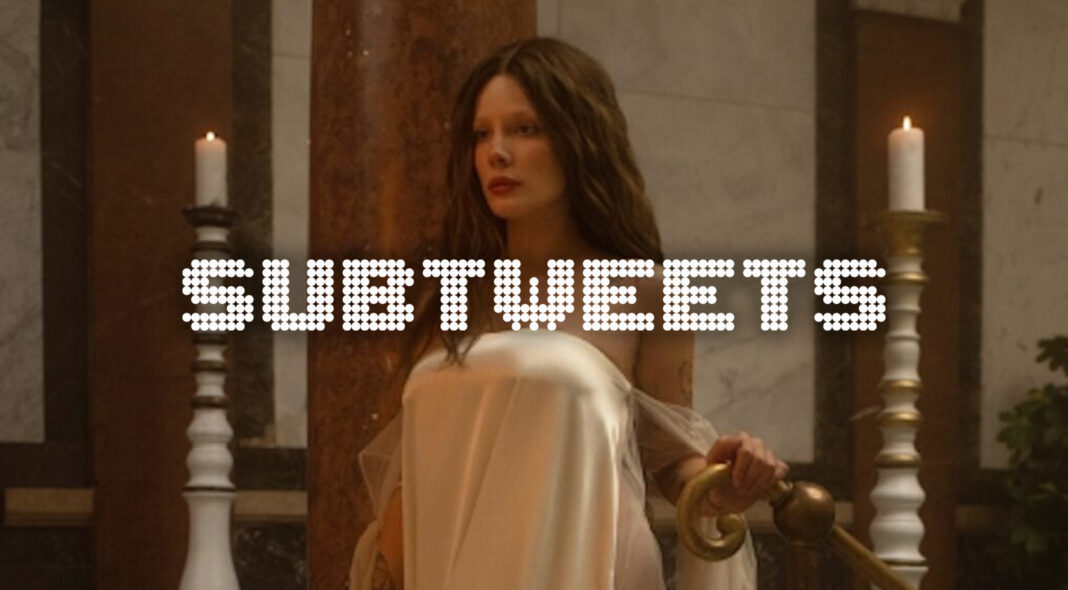Whether it’s the effects of lockdown or simply the realities of entering my late twenties, I cannot move for babies. They’re on my social media, in my immediate friend and family circles, bringing me more and more mushy feelings with every tiny toe photo or ‘milestone’ card. They’re coming up more and more in my work — chatting with artists and colleagues who have become parents amidst the pandemic, navigating a new world order of providing for a tiny new person without simultaneously losing themselves.
August in particular was a busy month for bouncing bundles of new popstar joy. Halsey and the Little Mix gals Perrie and Leigh-Anne all welcomed their first children, while Cardi B’s round-bellied appearance in Lizzo’s ‘Rumors’ video got people talking about how rare it is to see openly pregnant women in music videos (particularly when they’re depicted in poses that don’t strictly adhere to the demure, Mothercare-clad ideal). Even Drake has just dropped his emoji homage to babymaking, Lil Nas X announced his album with a bump photoshoot and August 28 marked 10 years to the day since Beyoncé‘s VMA’s pregnancy announcement, an iconic ‘mic drop’ moment that shook the world. In the world of music, babies are seriously trending.
New life is of course something to celebrate, but the most positive associations of a baby are still entrenched in the highest echelons of success; the musicians, influencers and artists for whom some of the rigours of parentage can be made more practical through financial security and access to round-the-clock care. If you’re not fortunate enough to be an international icon with a dedicated team, the realities of touring and performing with a kid can be significantly different.
“Being a musician, so much of the job is logistics, and then having a child just adds a whole new layer,” says Kate Staples, who has been touring as This Is The Kit since 2003 and gave birth to her child Mo in 2017. “Before my child started full-time education, I would bring them on tour with me and have to factor in what and when they would eat, how I could travel with them and all my gear, who would look after them when I was busy sound checking or performing or recording. Venues are not set up to be child-friendly and safe, so sometimes it felt pretty risky being in certain places with a small child. Add that on to the usual logistical challenges of being a touring musician and things start to get quite challenging.”
Being a musician on the road with a child in tow means opening yourself up to others’ scrutiny and judgements too. “People do make assumptions and see you differently too — they assume that every song you write is now about your child, or they judge the situations you’re putting your child in; noise levels, dirty dressing rooms, the potential for people at concerts to be drunk or under the influence and so on. And then even without the judgement, there’s the inevitable guilt that every working parent has — but with a special musician’s lifestyle twist!”
Childcare can also bring significant financial implications. A rockstar mum can’t necessarily chuck a bassinet in the back of a touring van and hope for the best, but a full-time tour nanny is a luxury that not everyone can afford. Most musical artists are self-employed or freelance to some degree, with all the uncertainties and moving parts that such a lifestyle can bring. Tours and studio time often gets booked far in advance, and when you’re a creative person, the impulse is to capitalise on it, to make a success of the opportunities that don’t always come around twice.
When Fiona Burgess fell pregnant with twins in late 2015, she was still fronting Woman’s Hour, an indie four-piece whose debut album ‘Conservations’ had set them on a path to critical success.
“For me, it was one of those classic things where I don’t think you know how you’re going to feel until after you actually have the kids,” she says. “When I got pregnant, we were working on our second album, and I got all the logistics sorted; my mum was gonna come down four days a week, and I had a very supportive husband who is also freelance and was super involved from the beginning with his flexible working hours. I didn’t know how long I would want off after the birth, but I knew that I wanted to get back to making music.”
When the twins were born, however, Fiona found that she hadn’t quite expected the degree of emotional and physical trauma that she would have to go through. “I had problems in every single arena and I just really struggled. I had a mental health team supporting me which was good, but I found it very overwhelming, and from about two months in, I was just craving normality. It was quite a relief to go back to writing and recording, but then 10 months in, the band broke up, and it wasn’t my decision. Obviously I respected it, but it was a shock, and it threw the balancing act in the air again. It was a real confronting moment for me as a person and as a parent; one of these questions of like, what do I do now?”
Knowing that she wanted to stay in work not just financially but for her own wellbeing, Fiona established herself as a music video director, working with the likes of Olivia Dean, Hayden Thorpe and Lapsley while also producing her own short films. It’s a career pivot that has kept her in an industry that she loves, but empowered her to make choices that suit both her and her children, and to use her platforms as a means to talk about some of the stigmas that still face women who choose to work.
“It’s not a selfish choice — creative work makes me a better person, friend and parent,” she says. “Being a parent gave me a lot of ammunition to get up and make this work, and I don’t know if I would have had that drive without it. I felt like I had a lot to prove in a short space of time. Even when I got pregnant in the band, I’m not gonna lie; even if it was unspoken, I felt this pressure that was like, ‘you can’t do both’. I was adamant, absolutely adamant that it was a joke –– men have kids all the time, and nobody talks about their careers being over.”
Though both Fiona and Kate talk about the joys and creative rejuvenation that guiding a new child through the world can bring (“watching Mo grow up and experience so many different situations and countries and cultures is just the biggest privilege possible,” says Kate), both do speak of times of feeling lost or uncertain, wishing there was more support out there. Organisations such as the Musicians Union do offer useful parental advice by way of financial and workplace assessment information, but can’t always replicate the self-recognition and community aspect that mothers need to see to feel empowered.
In May 2020, the organisation Women In Music conducted a report that corroborated a range of baby-related obstacles a woman might face if they wish to stay in the live music industry. It revealed that 28 percent of interviewees felt that they needed to hide their pregnancy from their employers so as not to lose work, while 21 percent said they had specifically decided not to have children because of perceptions of the impact it would have on their career. Though there were more positive statistics (85 percent of interviewees did feel they were able to return to some kind of industry work at some point after childbirth), a great many issues were raised relating to accessibility, the impracticality of conditions and a lack of both emotional support and visible role models were raised.
Even with cultural wealth and affluence, money can’t solve everything. When your career involves entertainment in the public eye, there are big decisions to make about a child’s privacy and public safety, guilt over missed milestones or extended touring stints away from home. There are all the usual hormonal shifts and physical complications that any new mother faces, but put through an exaggerated lens of expectation of ‘bounce back’ public scrutiny. There are endless stereotypes that believe that mothers must sacrifice their relatability or even their ‘sexiness’, with the potential to seriously hamper artistic expression. And then amongst all this change, there is the pressure to continue to execute as if nothing has happened at all; just this week, Halsey called out record execs for the insensitive way that they were treated when they first disclosed their pregnancy, feeling as if they were merely another product on a profit-making assembly line.
“There is this assumption that when a woman gets pregnant, people have to make decisions for her,” says Fiona. “I’ve got a friend who is a choreographer –– I got pregnant before she did, and I remember her calling me and being really upset because her manager had decided that she was going to want a year off. Every woman who gets pregnant will have a different reaction, but you do have to battle for what you want. We are in a moment where I think unfortunately, women do need to be more vocal about their experiences, and to demonstrate our possibilities so that other people can see.”
As society’s relationship with parenthood continues to evolve, we are already seeing changes in the way we perceive kids and creative careers. Back in the ‘00s X Factor years, a mum wanting to make it as a pop star was greeted with a patronising ‘isn’t she brave’ pity, a poor woman forced to trade in her dreams for a lifetime of Tommy Tippee purees. As both Kate and Fiona can attest, working as a creative can make you a better parent — more focused and able to share incredible life experiences with your child — but that doesn’t mean that it’s easy. We’re slowly becoming more accepting of female career ambition, and yet a snarky dichotomy of judgement still lingers, querying the choices of full-time pop mothers who bring their kids on tour and yet lamenting ‘wasted potential’ when an artist does decide to swap their stage clothes for maternity ones. We coo over stylised pregnancy announcements and grinning bump caresses, but our empathy and considerations don’t always extend past that initial stage.
As with most things, change begins with talking. So many artists out there are proving that it is distinctly possible to do both (or either) on joyful terms — Paloma Faith, Jessie Ware, Lily Allen, Katy Perry, Ellie Goulding — but all have spoken about the need for both society and industry to catch up to realities of managing both, and the adjustments that need to be made if women are able to do it healthily. Finding a happy, safe medium between parenting and music industry work shouldn’t only be a case of elite financial access or luck of the draw. From Cardi B right through to the young musician gigging pubs several nights a week, every parenting creative deserves the same right to childcare and judgement-free support with regards to their reproductive health and decisions.
“When Mo was little I was too overwhelmed and felt too self-conscious to make any demands about the conditions in which I was playing, so I ended up just trying to adapt to the situations and not inconvenience anyone,” says Kate. “It’s so easy to feel judged as a new parent, and I think it’d be great if it was seen as being more normal to be a musician and a parent at the same time. As ever, I think it’s so important that we cultivate and encourage an attitude of non-judgement towards peoples different parenting approaches.”
The end goal is to change social attitudes. “So often we make this a women’s conversation, but we need to involve everyone,” agrees Fiona. “Socially and culturally, we need to empower people of all genders to do what works for them, to get away from this idea that childcare is all women’s work. With creatives especially, there is that passion to work where it’s more than just a paycheque, you know? We have a real challenge ahead, but it’s something that should be treated with optimism; if we support each other, we can. show what is possible.”
Every week, Jenessa Williams unpacks the biggest topics setting Music Twitter alight. Dive into even more Subtweets in her weekly column.







